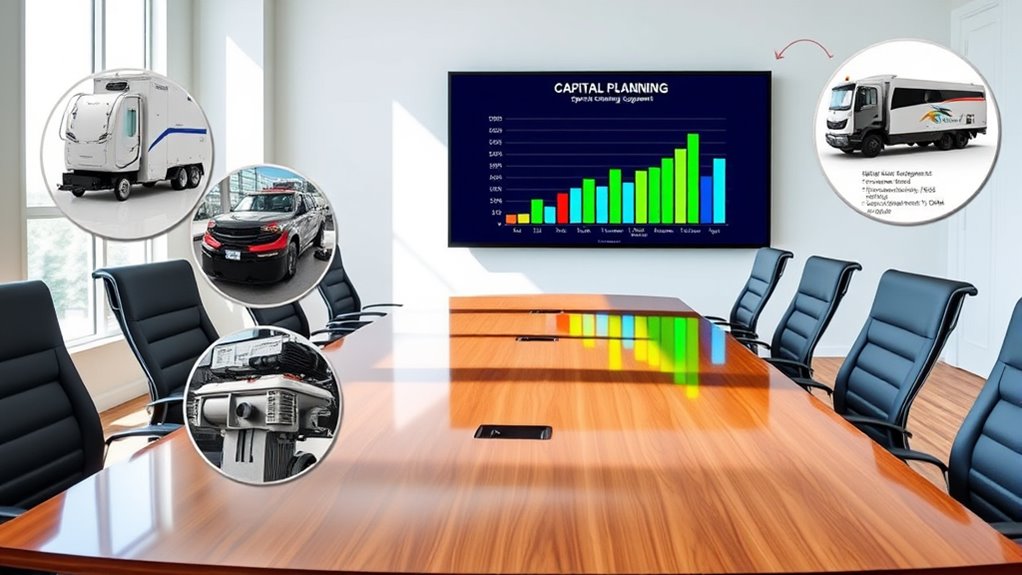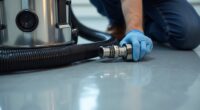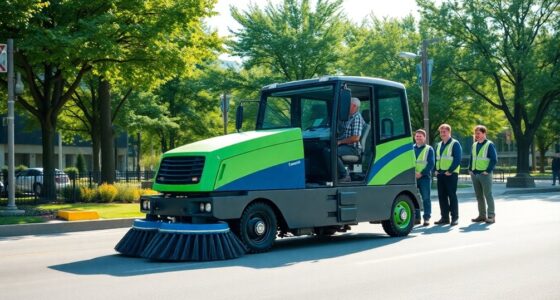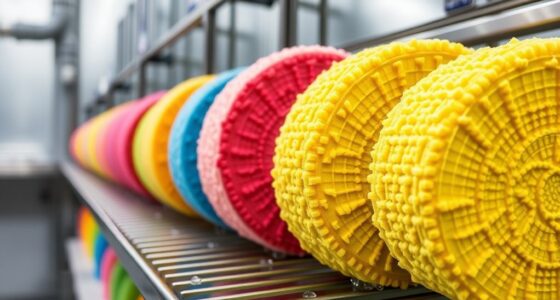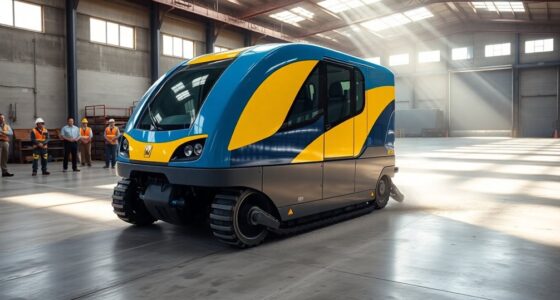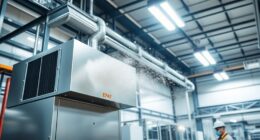Effective capital planning for your specialty cleaning equipment helps you allocate resources wisely, ensuring you maximize equipment lifespan and maintain operational reliability. By understanding each asset’s lifecycle, you can budget for purchases, repairs, and replacements before breakdowns happen. This proactive approach prevents costly surprises and supports long-term efficiency. Focusing on equipment needs and prioritizing investments will keep your operations smooth—continue exploring to learn how to develop a strategic plan that aligns with your goals.
Key Takeaways
- Conduct regular lifecycle assessments to forecast replacement needs and allocate funds proactively.
- Prioritize equipment based on usage, operational impact, and remaining lifespan for effective budgeting.
- Incorporate total cost of ownership analysis to ensure comprehensive financial planning for acquisition and maintenance.
- Integrate capital planning into overall financial strategy to prevent unexpected expenses and ensure operational continuity.
- Maintain detailed records of equipment status and performance to inform timely upgrades and optimize resource allocation.
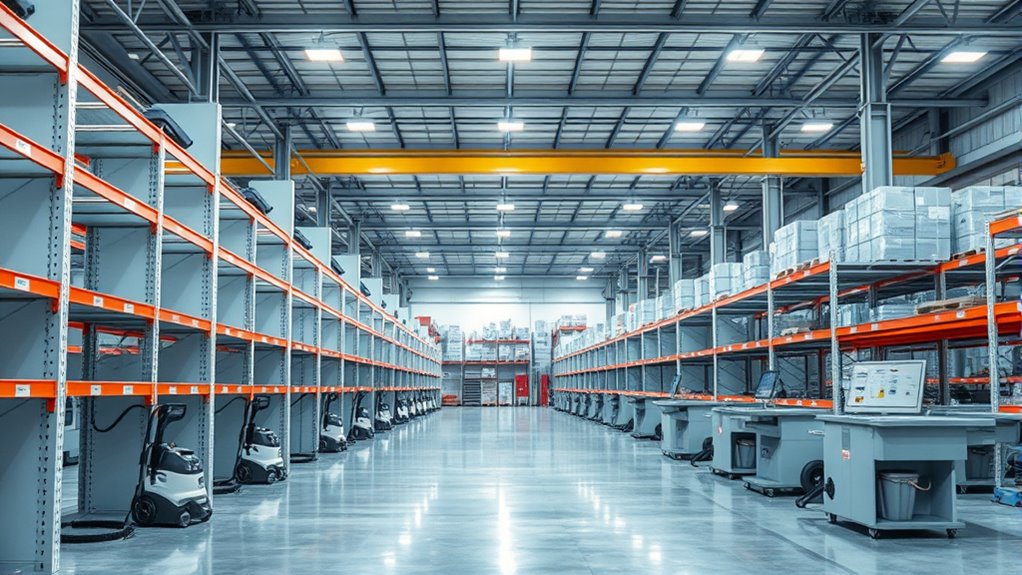
Effective capital planning is essential when investing in specialty cleaning equipment, as it guarantees you allocate resources wisely and meet your operational needs. Understanding the equipment lifecycle is a crucial part of this process. From the moment you purchase a piece of equipment, it begins its lifecycle, which includes stages like acquisition, operation, maintenance, and eventual replacement or disposal. Knowing where your equipment stands in this cycle helps you plan for upgrades or replacements before performance declines or costs escalate. By tracking the lifecycle, you avoid unexpected breakdowns that could halt operations and lead to costly emergency purchases. This proactive approach ensures that your capital investments are maximized over the equipment’s lifespan, providing reliable cleaning performance and cost efficiency. Additionally, implementing proper asset management practices can significantly enhance your ability to monitor equipment health and make informed decisions. Budget allocation plays a critical role in effective capital planning. You need to set aside sufficient funds not only for initial purchase costs but also for ongoing expenses such as maintenance, repairs, and eventual replacement. Proper budget allocation prevents surprises that might disrupt your operations. When planning, consider the total cost of ownership—this includes purchasing, operation, maintenance, and disposal costs. By doing so, you can develop a thorough financial plan that aligns with your operational goals. This approach ensures you have the necessary resources when equipment reaches the end of its lifecycle, avoiding last-minute budget shortfalls that could force you into suboptimal decisions like delaying replacements or opting for lower-quality alternatives.
It’s also beneficial to prioritize your equipment needs based on operational urgency and expected lifespan. For example, high-use equipment with a shorter lifecycle may require more frequent budget allocations, while durable machinery might warrant longer-term planning. Regularly reviewing your equipment inventory and analyzing usage patterns can help you identify which pieces are approaching the end of their lifecycle. With this insight, you can make informed decisions about when to repair, upgrade, or replace, ultimately optimizing your budget and ensuring seamless operations.
Furthermore, integrating capital planning into your overall financial strategy helps you avoid reactive spending. Instead of scrambling for funds when equipment fails, you proactively reserve capital based on lifecycle projections. This foresight allows you to maintain a steady cash flow and avoid unnecessary borrowing or rushed purchases. Ultimately, by understanding your equipment’s lifecycle and carefully allocating your budget, you ensure your specialty cleaning operations stay efficient, reliable, and financially sustainable over the long term.
Frequently Asked Questions
How Often Should Equipment Upgrades Be Considered in Capital Planning?
You should consider equipment upgrades every 3 to 5 years, aligning with its lifecycle and ensuring peak performance. Regularly review upgrade timing based on usage, maintenance history, and technological advancements. By staying proactive, you prevent unexpected breakdowns and extend equipment longevity. Scheduling upgrades at appropriate intervals helps maintain efficiency, safety, and compliance, ultimately saving costs and ensuring your specialty cleaning equipment remains effective and reliable over its lifespan.
What Financing Options Are Available for Specialty Cleaning Equipment?
Think of financing as your toolkit for acquiring specialty cleaning equipment. You can explore leasing options, which act like a rental agreement giving you flexibility, or seek government grants that provide funding support. These options help you manage costs effectively and keep your operations running smoothly. By choosing the right financing, you guarantee your equipment stays current and your cleaning standards remain excellent without straining your budget.
How Do Maintenance Costs Impact Long-Term Capital Planning?
Maintenance costs considerably impact your long-term capital planning by influencing equipment lifecycle and maintenance budgeting. When you account for ongoing maintenance expenses, you can better predict the total cost of ownership and plan for future replacements or upgrades. By integrating maintenance costs into your budget, you ensure your specialty cleaning equipment remains reliable and efficient, ultimately optimizing your capital investments and extending the equipment’s useful life.
What Safety Regulations Affect Equipment Acquisition Decisions?
Safety compliance and regulatory standards critically influence your equipment acquisition decisions. You need to ensure that new specialty cleaning equipment meets OSHA, EPA, and local safety regulations to protect your staff and avoid fines. By prioritizing safety compliance, you reduce risks, improve operational efficiency, and demonstrate your commitment to a safe workplace. Always review regulatory standards thoroughly before purchasing to ensure your equipment aligns with current safety requirements.
How Can Technology Advancements Influence Future Equipment Needs?
You wonder how technology will shape your future equipment needs, and the answer’s almost hidden in plain sight. Automation integration promises smarter, more efficient cleaning, reducing downtime and costs. Meanwhile, environmental sustainability drives demand for eco-friendly solutions. As these advancements evolve, you’ll need to adapt your capital planning, prioritizing equipment that seamlessly combines automation with eco-conscious features—ensuring you stay ahead in a rapidly changing landscape.
Conclusion
Think of your specialty cleaning equipment as the foundation of a sturdy house. When you plan your capital investments wisely, you’re building a structure that withstands the test of time and heavy use. I once saw a cleaning crew invest thoughtfully in their equipment, and it was like planting seeds in fertile soil—growth and efficiency followed. With strategic planning, your equipment will support your business’s success, just like a well-built home stands tall through storms.
